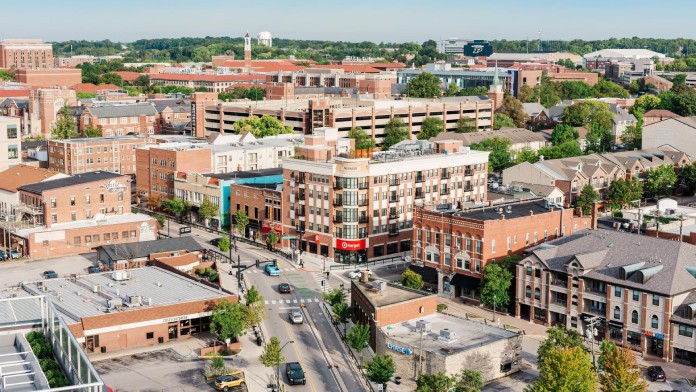Drug and Alcohol Statistics in Lafayette
Teens and young adults in Tippecanoe County are experimenting with drugs and alcohol. Statistics show:2
41% of 10th graders report drinking alcohol in the month before the survey
22% of 8th graders report drinking alcohol
20% of 7th graders have tried huffing
The latest Tippecanoe County Community Health Assessment revealed substance abuse and addiction as one of five focus areas due to growing numbers. The survey participants chose substance abuse as the top priority, followed by mental health concerns, which often co-occur with substance use disorders. A report from 2021 confirms addiction is killing too many Tippecanoe County residents.3
More people can receive recovery treatment by working with drug and alcohol rehabs in Lafayette. A primary goal is to ensure that anyone who wants treatment can get it, even those who cannot afford it. Free and low-cost treatment services are available through the following:
- State funding that covers treatment costs for those who can’t pay
- Scholarships
- Discounts or sliding scale fees
- Medicaid or Medicare
- Payment plans
Levels of Substance Abuse Care
Indiana offers several levels of care for addiction treatment. Some people start with inpatient care and make their way through the various levels, while others can begin the process with less intensive treatment.
Alcohol and Drug Detoxification
Detox is often the first step, allowing you to move on to formal treatment services once it is complete. It is the process of safely and comfortably removing drugs or alcohol from your system, in a supervised setting.
Inpatient Drug and Alcohol Rehab
Inpatient rehab, also called residential treatment, involves living at a facility to receive 24/7 care. Treatment methods typically include individual and group therapy, medication, and nutritional counseling.
Partial hospitalization programs (PHPs)
PHPs allow you to attend treatment at a hospital while living at home. Treatment services provided are usually the same as inpatient care, but you only stay at the hospital during treatment times, then return home.
Intensive Outpatient Programs (IOPs)
IOPs involve attending several hours of counseling over a few days each week. You spend the rest of your time working, at home, or fulfilling other obligations.
Standard Outpatient
Standard outpatient care is the least intensive treatment option, involving just one to two hours of treatment per week. This option is appropriate for highly motivated people with a strong support system.
Relapse Prevention
Relapse prevention, or aftercare, begins once you complete a rehab program. It includes ongoing support, such as 12-step groups, non-12-step groups like SMART Recovery, ongoing therapy, sober living homes, and more.
How to Pay for Substance Addiction Treatment in Lafayette, Indiana
Private Insurance
Every insurance provider is required by law to cover substance abuse and mental health treatment services, to some extent. Indiana residents must contact their provider to learn more about specific coverage, including deductibles and copays.
Indiana Medicaid
Indiana Medicaid consists of multiple programs. Each program serves a different population, but the common theme is to provide services for low-income or under-resourced Indiana residents, including rehab treatment. The programs include:4
- Healthy Indiana Plan
- Hoosier Care Connect
- Hoosier Healthwise
- HoosierRx
- Medicare Savings Program
- Pharmacy Benefits
- Traditional Medicaid
- Indiana Medicaid Covered Services
Indiana Medicare
Indiana Medicare is a government program that provides health-cost coverage for residents who are over age 65 or have certain disabilities. Indiana residents can use Medicare to pay for drug addiction treatment services, including rehab. However, not all rehab facilities accept this form of payment.
Sliding Scale Rehabs
Some rehab programs in Indiana charge for treatment on a sliding scale, meaning participants only pay what they can afford based on income. These sliding-scale options are not always widely advertised, so Indiana residents should ask if they are available.
TRICARE in Indiana
Indiana TRICARE (North region) is a government program providing health insurance coverage to U.S. Armed Forces military personnel, veterans, and their dependents. This coverage includes addiction treatment services, such as rehab.
IHS-Funded Drug Rehabs
Indian Health Service (IHS) is a program that provides free addiction treatment to Indigenous people and Alaskan Natives. These Indiana residents can obtain free treatment even if other coverage is available.
Traveling to and Within Lafayette
 Lafayette is just over 60 miles from the Indianapolis International Airport, which has six major airlines providing hundreds of daily flights. If you plan to fly, you must choose a secondary mode of transportation once you land. Fortunately, you have many options to help you get to and around Lafayette:4
Lafayette is just over 60 miles from the Indianapolis International Airport, which has six major airlines providing hundreds of daily flights. If you plan to fly, you must choose a secondary mode of transportation once you land. Fortunately, you have many options to help you get to and around Lafayette:4
- UBER, Zipcar, and Lyft
- Six shuttle services
- Six cab and taxi companies
- City bus
Your length of stay may determine where you stay. If you are here for a weekend visiting a loved one in a Lafayette drug rehab, you may want to stay in one of the 32 hotels in the area. If you are going to stay in Lafayette for a while, you may choose an AirBnB or VRBO rental. Other options include:4
- Camping and RV
- Bed and Breakfasts
- Extended stay suites
Lafayette is surrounded by West Lafayette, Purdue University, and hundreds of healthy activities you can do alone, with family, or in large groups. In your spare time, visit4
- Amusement parks
- Golf courses
- Art classes
- Theater, including the oldest drive-in
- Wabash River
- Restaurants with over 400 culturally diverse options
- Purdue sports events
- Concerts and festivals
Lafayette has many groups that support recovery, including local AA, NA, and Alateen chapters with daily meetings. It is a great place to embark on your journey to better mental and physical health.
Indiana Alcohol and Drug Laws
Indiana lawmakers have enacted the following policies related to substance misuse and overdoses1,2,3,4
Indiana Lifeline Law: This policy provides immunity for the crimes of minor possession, minor consumption, minor transport, and public intoxication for Indiana residents who reveal themselves to law enforcement while seeking medical assistance for a person suffering from an alcohol-related health emergency.
Social Host Liability: Indiana residents can be held liable if they give alcohol to someone they knew was already intoxicated and that person’s intoxication leads to injuries, damage, or death. It is also illegal to knowingly provide a place for minors to drink alcohol in Indiana.
Drinking in Public: In Indiana, it is illegal to be drunk in a public place if your behavior is dangerous, alarming, disruptive, or annoying. It is also illegal to be drunk or high on public transportation or at bus stations and airports.
Involuntary Commitment: Indiana Code 12-23-11.1-1 states that an Indiana resident who is a drug abuser, alcoholic, or incapacitated by alcohol may be involuntarily committed, except for those who are charged with or convicted of an offense that makes them ineligible for treatment.
Good Samaritan and Naloxone Access Law: his combined law is designed to prevent overdose deaths. The Good Samaritan protections provide limited criminal immunity for controlled substance and drug paraphernalia possession for Indiana residents who seek help in the event of an overdose.
This immunity is limited to those who call for help and not the person experiencing the overdose. Immunity is also limited to those who have obtained naloxone through the channels outlined in this law, which allows pharmacies and health professionals to provide naloxone directly or by standing order to those at risk of opioid-related overdose and those who are in a position to assist individuals at risk of overdose.
Resources
- Tippecanoe County Coroner’s Office. 2021. Summary of Findings for Manner of Death.
- Tippecanoe County. 2022. Alcohol and Substance Abuse Information.
- Tippecanoe County Health Department. 2021. Community Health Assessment and Improvement Plan.
- City of Lafayette, Indiana. 2022. Our Community.



